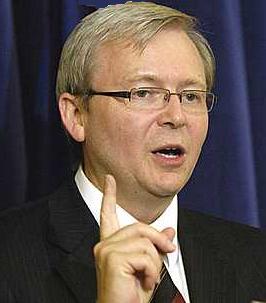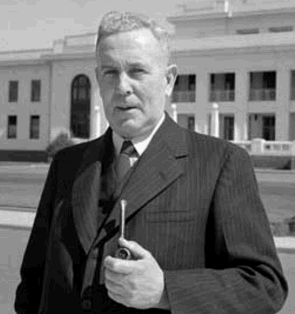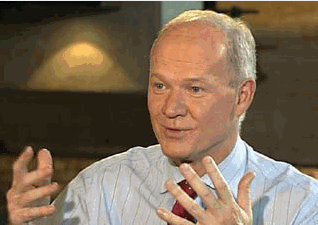|
Harry Robinson Muses About a Super - Bureaucrat Turned Prime Minister |
One night in mid-May Kevin Rudd revealed his mindset. It wasn't candour, more a dropping of the guard. The result will interest strategists of the Ed-Sci community who must now be looking for the best way to approach our new government.
|
|
|
Kevin Rudd |
The moment came during The 7.30 Report, Kerry O'Brien in the interrogator's
chair. The subject was pensions and their absence from the budget. TFW last
month noted that 2UE's shock jock, Steve Price, had turned sob jock with a
campaign to raise pensions on the basis of widespread poverty. His case was
loosely argued but it was politically powerful, especially when the 7 Network
rode in with support on This Day Tonight. Soon Price had reinforcements
throughout media but not a word from Wayne Swan or Kevin Rudd.
O'Brien asked why was the government and the budget silent?
Rudd responded in his calm, cool way that the government was aware of the need
to do something but it was a complicated matter and would be part of an overall
review of the total tax regime -- due at the end of 2009.
O'Brien pressed the question, saying that the word 'pensioner' did not once
appear in the budget speech of a week before.
Here came the revealing moment. Rudd looked puzzled. He was not objecting to the
question, simply wondering why O'Brien was pushing it when he, Rudd, had already
said the government was thinking about a better deal for pensioners --- all in
good time, when the system got to it.
The moment was replayed next night on commercial TV and labelled "Excuses."
In the Rudd mind, popular campaigns carried no weight while long term process
and planning were paramount. This is the mind that educators and researchers
will have to deal with. The mind of John Howard was different. It saw every
proposal as a challenge demanding sudden action. It had no room for what he
dismissed as 'the vision thing' while the mind of Bob Hawke always sought
consensus around pragmatic questions. He had little time for innovation.
The Rudd mind had a distinguished predecessor.
|
|
|
Ben Chifley |
Let's go back to mid 1949. The scene is the prime minister's office in Old
Parliament House. It is airy and spacious and the walls carry several Australian landscapes, notably an exquisite Tom Roberts of, if memory serves, a scene
at Mosman Wharf. Nothing exquisite, though, about the incumbent Ben Chifley
sprawling in his large chair. He smokes his pipe -- or rather he smokes matches.
He used to load his pipe, strike a match, light the tobacco, become carried away
with the conversation, forget to draw on the pipe. The tobacco would go cold and Chif would strike another match. In spite of his strine speech and lack of
pretension, Chif is self-assured and virtually unflappable. His record included
three war years as treasurer which brought us out of the conflict as solvent as
could be. An admirable man but even admirable men take wrong turns.
This morning he is talking with Ned Hanlon, labour premier of Queensland -- a
foxy man with the wary manner of an SP bookmaker. Hanlon was less than nice but
he knew where votes came from and why. They talked briefly about the death of
Chifley's Bank Nationalisation bill, an audacious attempt to give federal
government control of all the nation's finances.
It sounds dry and dusty now but it raised hell in 1947 -- 48 until finally
killed by the Privy Council.
Chifley admitted disappointment but went on that he had plenty in mind for the
nation, such as the Snowy Mountains hydro electric scheme. He had a vision far
beyond any light on any hill.
"Ben," said Ned Hanlon, "The dogs are barking that you will probably lose the
election at the end of this year."
Another match, another draw on the pipe. Then an inquiring "Oh?"
"It's not Bank Nationalisation that is sinking you, it is your administration.
You have price controls, inspectors telling butchers how much to charge for a
pound of chops, you insist on retaining petrol rationing . they are saying the
war ended four years ago and you've still got controls on damn near everything.
They are sick of it."
The revealing moment: Chifley said nothing. He just smiled and lit another
match. His plans prevailed over popular politics. The election campaign came and
Chifley continued to defend his controls and rationing.
Liberal forces picked up the discontent and ran on radio a series of political
ads voiced by "John Henry Austral" whose main line of attack was to threaten the
nation with "Planned Economy." Oh the contempt!
In December, six days before Christmas, the Chifley government was thrown out --
decisively.
Let's move on to the late 80s. Wayne Goss is a kind of 'New Labor" opposition
leader in Queensland. In 1989 Goss wins a state election hands down and becomes
premier. After the sterility of the Bjelke-Petersen years, there is plenty to
clean up, plenty to initiate. Wayne Goss is a busy man. He chooses one Kevin
Rudd as his chief-of-staff and later promotes him to head of the department of
state cabinet. He is said to be the pilot of Goss reform.
Fast forward now to 1996. Things have been going well, the state is now a better
place. But voters, being a wilful lot, are unhappy with some of the Goss
Reforms. Nothing seems to register on the minds of the government. In one
instance, a new freeway from Brisbane to the Gold Coast is planned to run
through three electorates where landowners are shouting "Murder, bloody murder."
|
|
|
Wayne Goss |
The government sticks to its plan. The government is tossed out of office.
We shall probably never know how much blame attaches to Kevin Rudd but he was a
partner in the Goss downfall. And as we now can see he thinks well, means well
but is inclined to trust his processes and visionary plans with insufficient
heed for the here-and-now demands of the ordinary folk. The pensioners affair
continues to play against Rudd. Commercial radio commentators as well as some
ABC people take it as a given that the government is being mean to pensioners.
This Day Tonight runs a nightly "Adopt a Pensioner" segment. (It patronises the
recipients but keeps the issue alive to the government's disadvantage.)
A few days later, Rudd compounded the effect when he said the government had
done all it physically could against rising prices for petrol and groceries. The
vox pop roared, "Not good enough! Do more!" Rudd was probably right but being
right wins few votes.
Perhaps the ghost of Ned Hanlon should return to give advice in the PM's office
in New Parliament House.
Vice Chancellors, FASTS and other advocates now have a road map to the mind of
their potential benefactor. On one hand he is blind to the argy bargy of daily
politics, on the other he has visions. Like Chifley.he hungers for long term,
big horizon enterprises. His modus operandi is that of the super-bureaucrat who
uses process and planning to turn ideas into reality. Given time, he might well
lift our game in broadband, port and road infrastructure, water and, yes, higher
education .


